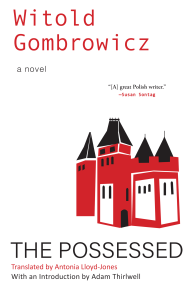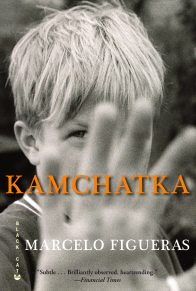“The first great talent of this young Estonian author is to make us laugh about complex subjects . . . The sense of humor and the imagery resembles a graphic novel or animated film . . . Probably one of the best contemporary novels about what it means to be alone . . . Marvelous in all senses of the word.” —Le Monde
“Epic, fantastical . . . Most astonishing is the inventive imagery, from lice crossbred large enough to be ridden by people to a legless flying savior who swoops across the cold sea to bludgeon knights and monks . . . Kivirähk’s well-plotted story of language, loss, and fanaticism speaks powerfully to our world’s ever present conflicts.” —Kirkus Reviews
“This translated Estonian treasure follows the adventures of a boy who is the last remaining speaker of Snakish, an ancient language by which he can command any animal.” —Entertainment Weekly
“This delightful Estonian novel coils and springs with a mix of dark humour, satire and allegorical observation . . . [an] intriguing story . . . a thought-provoking tale . . . The author’s skill for social criticism and his literary talents are evident in Snakish, and he clearly has a gift for creating suspenseful, provocative stories . . . The Man Who Spoke Snakish is wonderful—don’t let it slither away.” —Kathryne Cardwell, Winnipeg Free Press
“This novel slithers along like the snakes it so admires, agile and often unexpectedly compelling . . . its irreverence for convention flows charmingly from its conversational prose . . . Readable and engaging, it’s easy to see how this novel could become the delight of a nation.” —Emma Schneider, Full Stop
“[A] tumultuous Tolkien-like epic set in early medieval Estonia, where forces of modernity and tradition clash in a primeval struggle for the Baltic nation’s soul—and it’s future . . . At its essence, this book is a Bildungsroman, a coming of age saga about a young man reconciling with a world experiencing seismic change . . . A strange, wondrous book.” —Robert Collison, Toronto Star
“This allegorical story spins an element of wistful longing for anyone who has struggled between the old and the new, its lessons as relevant today as ever.” —Booklist
“This novel is totally unusual; it has the same strangeness as La Locura de Dios by Juan Miguel Aguilera or Cold Skin by Albert Sanchez Piñol. The author talks about Estonia (his country) in the 13th century, when ‘iron men’ invaded the country on a crusade. It jumps between philosophical fable, political pamphlet, Nordic saga, and includes some epic outbursts of violence.” —Decitre.fr
“Somewhere near the realms of fantasy and science fiction there exists a much more thrilling and allegorical form of writing, bending the rules of the genre to suit itself: Atwood’s admonitory novels, Vonnegut’s attempts to reach outside the bounds of reality and time, Bradbury’s philosophical allegory encased within a science-fiction story . . . The Man Who Spoke Snakish is an allegory about fading eras and vanishing worlds, and laced with a good dose of black humor to boot.” —Jürgen Rooste, Estonian cultural critic
“Fable-like, timeless . . . The Man Who Spoke Snakish is a great novel, one of those important books that speaks to your soul in its own language and which marks a milestone on your personal reading history and in the development of your opinions.” —Blog des Bouquin
“An incredible novel, a mystifying treasure of a book. It will give you a raging desire to visit Estonia.” —Psychologies Magazine
“A novel in which there is no downtime and which is great fun to read . . . a tragic and deeply political work, but one in which shards of laughter await on every page . . . It is good, it is beautiful, you will read it in one sitting, it radiates intelligence . . . It is a true literary miracle.” —L’Ivre de Lire
“The Man Who Spoke Snakish interrogates not only the literary logic of the allegorical mode but also the relationship we have—as individuals and as readers—to the dueling lures of tradition and change . . . a kind of bucolic Bildungsroman . . . Kivirähk provides a compelling and creaturely backdrop for the warring facets of Leemet’s coming-of-age, characters who embody aspects of the distant past, the painful present, and the dangerous future . . . I felt compelled to continue reading in the certain knowledge that I’d soon stumble upon a scene of great power and beauty or an elegantly aphoristic turn of phrase. Though presumably set hundreds of years before our own time, Leemet’s struggle remains something of a microcosm of our own.” —Dustin Illingworth, Words Without Borders
“Lots of fun here, with seductive bears, flying frogs, and a viper named Ints, but Kivirähk is also concerned with the dangers of war, colonization (particularly Christianity’s breakdown of traditional belief), and idealizing the past. A big bestseller in Europe, with that ever-popular medieval/fantastical setting.” —Barbara Hoffert, Library Journal
“This fantastical Bildungsroman has the feel of a classic. It’s a yarn in every sense of the word—a bit Tin Drum, a little Where the Wild Things Are, and with a cast of talking snakes, bears, lice, and primates, more than a little Watership Down . . . The novel shines . . . Readers who are charmed by the world Kivirähk creates here, by the imaginative breadth and offbeat characters, will be satisfied just inhabiting this world for 450 pages. Credit is due, too, to the translator and editor, who have made the English feel consistently natural, readable, authentic.” —Johnathan Wilber, New York Journal of Books
“The Man Who Spoke Snakish has the feeling of a folktale . . . This isn’t to say that it’s a work of light fantasy, however—like Margo Lanagan’s 2008 Tender Morsels, there’s an undercurrent of violence that keeps the more mirthful aspects at a distance.” —Tobias Carroll, Literary Hub














